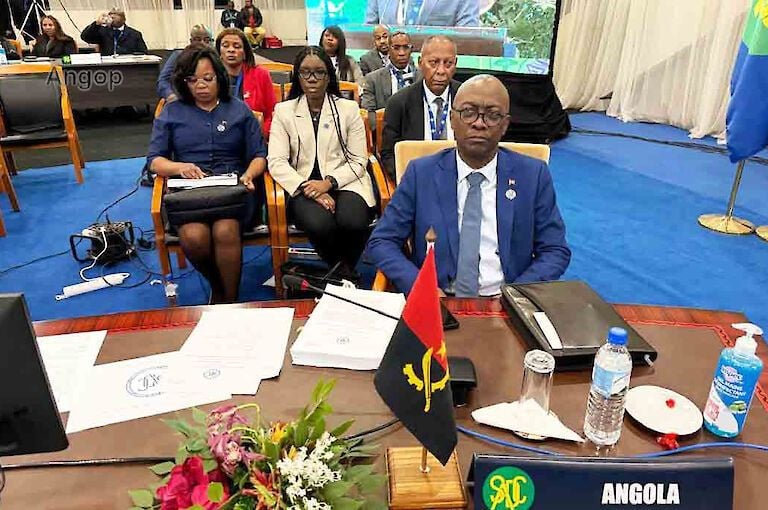

SADC congratulates Angola on joining the regional free trade area
Antananarivo (From the Special Envoy) - The Council of Ministers of the Southern African Development Community (SADC) congratulated the Angolan government on joining the regional bloc's Free Trade Area (FTA) and pledged to support the country in effectively fulfilling this mission.
The information was released this Friday by the Minister of Planning, Victor Hugo Guilherme, at the end of the regional organization's Council of Ministers meeting, which precedes the 45th Summit of SADC Heads of State and Government, scheduled for the 17th in the Malagasy capital.
The SADC Council of Ministers also urged member states to facilitate the movement of people and goods within the southern region.
The meeting also addressed the conflicts that have impacted member states in terms of financial contributions to the regional organization.
According to the Minister of Planning, some member states are experiencing financial difficulties in fulfilling their statutory obligations.
Accession to the SADC FTA
In June 2025, Angola took a historic and strategic step by officially joining the Southern African Development Community (SADC) Free Trade Area (FTA).
The accession was approved on June 5th of this year, during the SADC Trade Ministers' meeting in Zimbabwe, marking the beginning of a new phase for Angolan trade in the region.
From now on, national products gain access to a regional market of 300 million consumers, promoting increased exports, stimulating domestic production, and creating jobs.
Accession allows Angola to join the region's common market, benefiting from reduced trade tariffs and greater access to regional markets.
Starting in December of this year, 90% of national products will have zero tariffs, and the remaining 10% will have their taxes gradually reduced over the next five years.
In practice, this means more business opportunities, cheaper products, more foreign investment, and greater competitiveness for Angolan companies. In other words, it marks the beginning of a new phase for the Angolan economy in regional trade.
The SADC FTA has existed since 2008, with 14 of the organization's 16 members already actively participating in trade transactions.
The ministers also analyzed the level of compliance with the decisions of the Council and the Summit held in August 2024, the organization's financial situation, resource mobilization, the Regional Development Fund, regional food and nutrition security, and the level of implementation of the Regional Indicative Strategic Development Plan (RISDP).
SADC-US Dialogue Forum
On the sidelines of the Council of Ministers meeting, the Angolan delegation participated in the SADC-US Dialogue Forum between Senior Officials of SADC and the US Department of State.
On this occasion, SADC's strategic priorities were presented, namely Vision 50 and the Regional Indicative Strategic Plan (RISDP) 2020-2030, as well as the creation of opportunities for inclusive growth between SADC and the United States.
SADC and the United States of America (USA) recently signed the Regional Development Goal Agreement (RDA), budgeted at US$223 million, in Gaborone, Botswana.
The agreement aims to address the areas of economic growth, democracy and governance, health, and climate change.
As published by the SADC Secretariat on its institutional website, the Regional Development Goal Agreement (RDA) will be implemented during the period 2023-2028 and administered by the United States Agency for International Development (USAID).
The Angolan delegation was led by the Minister of Planning, Victor Guilherme, and included the Secretary of State for Budget, Juciene de Sousa, the Secretary of State for Trade and Services, Augusta Fortes, the National Secretary of SADC, Flávia Lutucuta, the Angolan Ambassador to South Africa, Rui Xavier, and the Angolan Ambassador to Botswana and Permanent Representative to SADC, Beatriz Morais.
With its Secretariat based in Gaborone, the SADC comprises Angola, Botswana, Comoros, the Democratic Republic of the Congo, Eswatini, Lesotho, Madagascar, Malawi, Mauritius, Mozambique, Namibia, the Seychelles, South Africa, the United Republic of Tanzania, Zambia, and Zimbabwe.
Its mission is to promote sustainable and equitable economic growth and socioeconomic development through efficient production systems, deeper cooperation and integration, good governance, and lasting peace and security, so that the region emerges as a competitive and effective actor in international relations and the global economy. DC/SC

